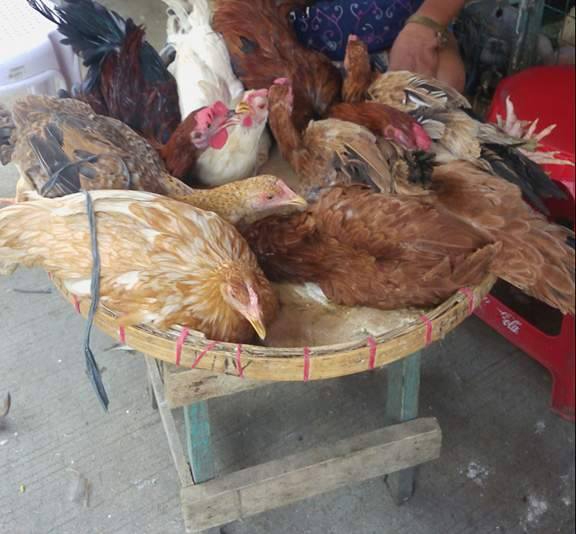
Native chickens like these sold at the Carbon Public Market are free from avian flu, but vendor Felix Alcantara says few are buying because of the bird flu outbreak in Pampanga. (CDN PHOTO/ MICHELLE JOY L. PADAYHAG)
As poultry products from Luzon have been temporarily banned from the Visayas and Mindanao area due to the Avian flu outbreak in Pampanga, migratory birds, which are possible carriers of the virus, are also being closely monitored by the Department of Agriculture (DA) and the Cebu City
Department of Veterinary Medicine and Fisheries (DVMF).
The migratory birds are usually in Olango Island and in Barangays Mambaling and Pardo in Cebu City.
City Veterinarian Dr. Alice Utlang said they have conducted blood sampling on the chickens in these areas and so far the results have been good, and no cases of bird flu have been found in these areas.
At the same time, the sale and consumption of chicken meat is being closely inspected, said Utlang.
“We are focusing on meat inspection. We doubled out efforts than the usual. Not only in the city, even in the province. We are required to conduct active surveillance,” she told Cebu Daily News.
The National Meat Inspection Service (NMIS) of DA also issued an alert order to all NMIS regional technical directors, veterinarians from local government units, and meat inspectors to declare a “Heightened Alert on Meat Inspection” in all poultry dressing plants.
They were also directed to organize a “Task Force Bantay AI” in their respective areas of jurisdiction and increase visibility or presence of meat regulatory enforcers.
The order was issued by executive director Dr. Ernesto Gonzales.
Meantime DA Regional Director Salva Diputado appealed to the public to report unusual deaths of chickens, ducks, quails and other poultry aninals.
“Ang unang sintomas gyud ani sa mga manok kay kung mamatay ni. Ikaduha, kung unusual ang iyang kamatayon o dili normal. Mao nga importante nga kung dunay makit-an nga unusual nga kamatayon sa manok, i-report dayon sa mga hingtundan, sa inyong munisipyo ba kaha o sa probinsya,” Diputado said.
(The first symptom for chickens is really death, and second if the death is unusual. That is why it is important to immediately report unusual deaths of chickens to the municipal or provincial authorities.)
Suppliers
Some suppliers of meat who get their stocks from Luzon for distribution in Cebu have also called the DVMF, according to Utlang.
“We are happy that these suppliers that source their supply from Manila called our office to ask for advise. We told them that all supplies as of August are not allowed here. If there are supplies before August, that’s okay,” she said.
These suppliers deliver to supermarkets, and fastfood chains in Cebu City.
In the province, Governor Hilario Davide III assured that all poultry products sold in the markets around the province are sourced from local farmers.
Nonetheless, he alerted all the hospitals in the province to be on the lookout for unusual illnesses or death.
“But we’re not taking any chances. That’s why, as soon as the news broke out, I told our provincial health office (Dr. Rene Catan) to alert our hospitals,” the governor said.
Movement
The Bureau of Animal Industry (BAI) of the DA central office issued an amended memorandum circular yesterday providing that while movement of live domestic and wild birds, including poultry meat, day-old chicks, eggs, semen, manure, and other products from Luzon to the Visayas and Mindanao is still not allowed, products from the Visayas and Mindanao can be brought to Luzon.
“Since Visayas and Mindanao remain free from Avian Influenza, the movement of live poultry, poultry meat, day-old chicks, eggs, semen, and other products from Visayas and Mindanao to Luzon will be allowed,” read the memorandum circular signed by Enrico Garzon Jr., chief veterinary officer and assistant secretary for livestock of the DA-BAI.
Movement of poultry products within Luzon is also allowed as long as it is outside the seven-kilometer radius control area of Pampanga.
There are also conditions for the Luzon-to-Luzon transport. A shipping permit and a veterinary health certificate certifying that these products were sourced from farms with no incidence of Avian Influenza for the past 21 days prior to shipment are needed for live domestic and wild birds like chickens, ducks, geese, quails, doves, and pigeons.
Poultry meat, including fresh, frozen meat, uncooked poultry products, also requires a shipping permit and a meat inspection certificate.
“The temporary ban will be lifted when there are no new cases reported 90 days after the stamping out activity including disinfection of all infected areas and surveillance,” the memo added.